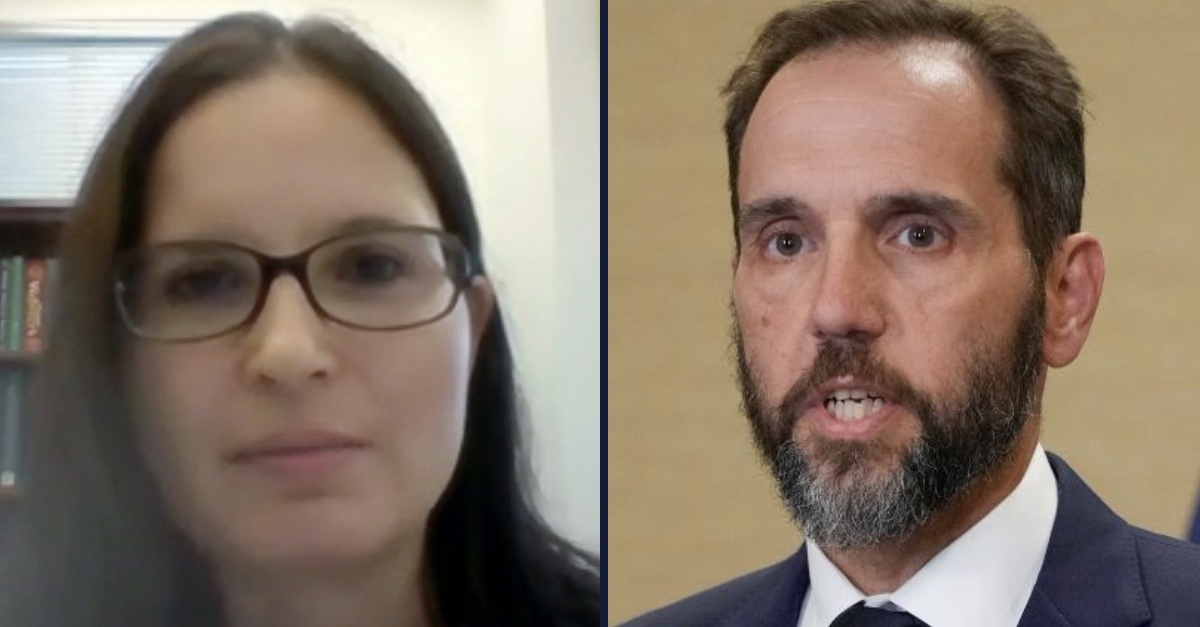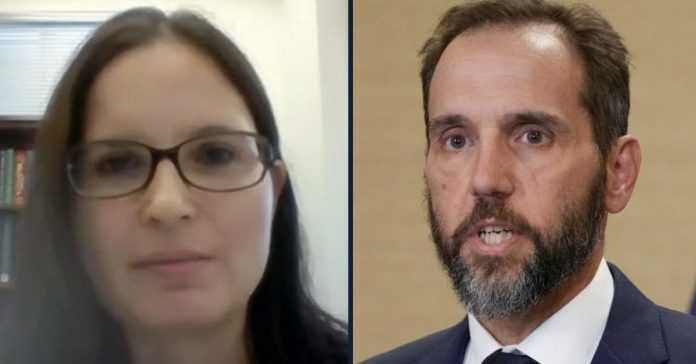
Judge Aileen Cannon (left) during a Senate Judiciary Committee oversight nomination hearing on July 29, 2020 (U.S. Senate via AP), Special counsel Jack Smith (right) speaks about an indictment of former President Donald Trump, Aug. 1, 2023, at a Department of Justice office in Washington. (AP Photo/Jacquelyn Martin)
Federal prosecutors are set for a sealed hearing on Wednesday in former President Donald Trump’s Mar-a-Lago classified documents case.
Special counsel Jack Smith will appear before U.S. District Judge Aileen Cannon on Wednesday morning. Cannon said in a paperless order filed in federal court on Jan. 11 that the hearing will be held to evaluate classified filings by Smith being sought by Trump and his co-defendants.
“This hearing shall be conducted on a sealed, ex parte basis in a facility suitable for the discussion of classified information,” the docket reads. An ex-parte hearing means outside the presence of the other party, meaning Trump and his attorneys will not attend.
The case stems from Trump’s indictment in the Southern District of Florida accusing him of mishandling and illegally retaining classified and sensitive records after leaving office, including storing them in his bathroom and shower at Mar-a-Lago and allegedly showing them off at his golf club. Trump and two co-conspirators — Walt Nauta and Carlos De Oliveira — have pleaded not guilty. The trial is currently slated for May 20.
As Law&Crime reported last week, Trump has doubled down on claims that his Florida-based prosecution is part of a conspiracy that encompasses the federal government and media organizations.
In a motion to compel filed on Jan. 16, Trump’s lawyers accused Smith of hiding evidence in the case.
Smith and his team of prosecutors, Trump attorney Christopher Kise wrote, are seeking to “avert its eyes from exculpatory evidence in the hands of the senior officials” not just at the Archives but at numerous agencies like, he claims, FBI, the Justice Department, the White House, the Office of the Director of National Intelligence, the Department of Energy, the National Security Agency, the State Department and others.
Two days later, Smith filed an opposition to Trump’s motion, pushing back on the accusation of hiding evidence and taking a dig at the truthfulness of Trump’s motion.
“The Government supports full transparency of the record consistent with witness safety, national security, and the court’s protective order, in part because that transparency will expose the defendants’ distortions of the factual and legal landscape in their motions to compel,” Smith wrote in the Jan. 18 filing.
Trump’s lawyers fired back a few days later, accusing Smith of wrongfully contributing to public interest in the case.
“The Special Counsel’s Office chose to bring this case and has taken unprecedented steps to fuel biased press coverage and public interest in the proceedings in order to interfere with President Trump’s leading campaign for the presidency,” the motion says.
Attorney General Merrick Garland is also in on the conspiracy, according to Trump’s lawyers.
Among the “unprecedented steps” are what Trump’s attorneys describe as “conspicuously timed and tellingly defensive public statements by the Attorney General, released by CNN on January 19, 2024, in which he inappropriately sought to place DOJ’s imprimatur behind the Office’s untenable demand for a ‘speedy trial’ in this case and on the lawless charges filed in the District of Columbia.”
Trump is also facing indictment in the nation’s capital for allegedly trying to subvert President Joe Biden’s win in the 2020 election.
In his Jan. 18 filing, Smith urged Cannon, a Trump appointee, to keep sensitive information out of the public eye.
“[O]ut of concern for witness safety and the reasons explained below, the Government opposes the Motion for Temporary Leave to File Redacted Brief — in effect a motion to disclose Discovery Material subject to the Court’s protective order — to the limited extent that the motions to compel or their exhibits identify any prospective Government witness, constitute Jencks Act material for the same, or contain certain additional discrete sensitive information specified below,” Smith’s opposition says.
Trump’s attorneys, in their response, accused the special prosecutor of failing to show why such information needed to be sealed.
“[T]he Office made no effort to substantiate its vague claims concerning ‘witness safety’ and ‘national security’ as they relate to the requested redactions,” the motion says. “Many of the ‘potential witnesses’ referenced in President Trump’s motions to compel have been disclosed in public reports relating to the case, in some instances based on apparent leaks by prosecutors, and in the FOIA releases discussed in President Trump’s motions, which reveal some of the witnesses’ government email addresses.”
Read Trump’s reply to Smith’s opposition here.
Law&Crime’s Marisa Sarnoff contributed to this report.
Have a tip we should know? [email protected]

